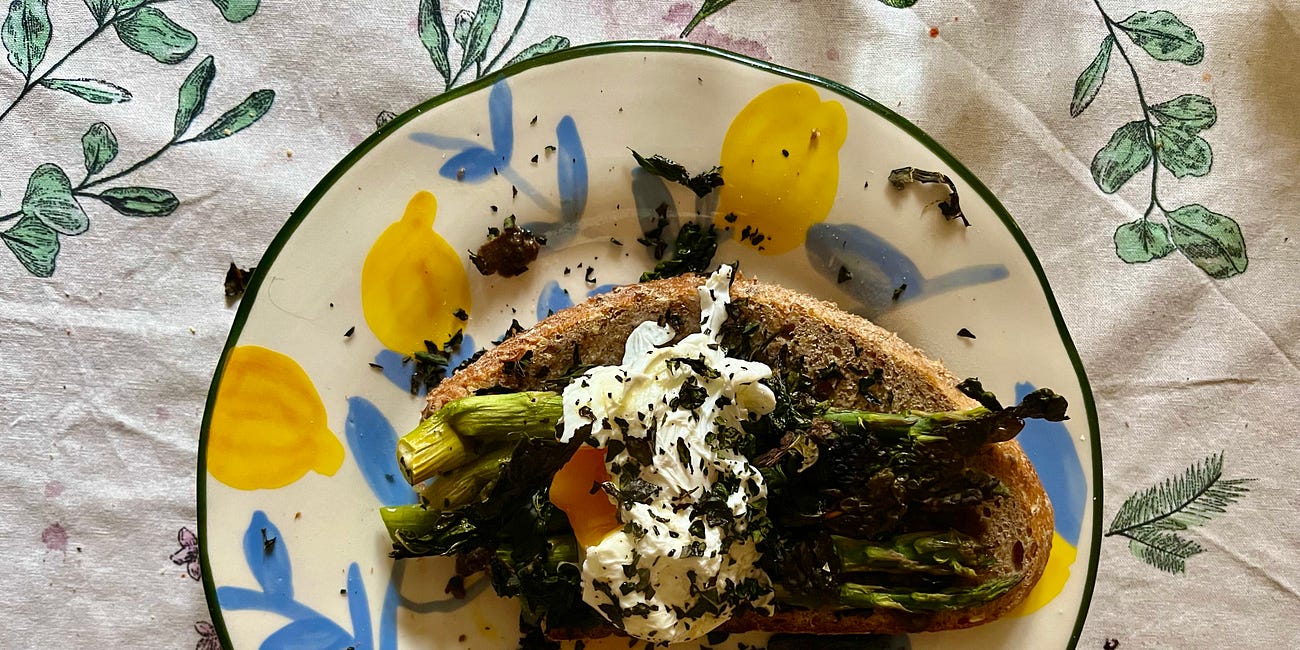Alone in the Kitchen
(not lonely) reading Virginia Woolf and George Orwell; recipe for a minestrone
If the water has boiled, my body is still warming up, rinsing and chopping unpeeled vegetables, crushing the garlic clove and halving the onion. Mix everything together, lower the heat, leave the casserole alone, skimming off the foam occasionally. The simmering of a broth is a form of meditation I trust. Its preparation follows a chain of steps and each broth becomes an alternated repetition of the previous iteration, similar yet dissimilar enough to be noticeable. A broth serves purpose for cold and warm meals, fragrant and oily, discreet and intense, crystal clear or foggy, its recipe tends to illness and reinforces health. Not one broth ever tastes the same, regardless of how attentive the cook may be, how many cookbooks they may have read and how many tips from colleagues, friends and family they may collect. There simply isn’t a shared method for it as broth is timeless: bring water to the boil, simmer, add the ingredients and let the mixture reduce into a dense and rich liquid. It is a false assumption that to diminish something or someone to a smaller or quieter form of being will eradicate their powers and meaning, rendering them unseen and silent. Existence, regardless of forms but in regards to being, soaks in remembrance not volumes. Pour a few ladles of broth into a cup (pause: any seasoning?); sip; tasty, right?
Standing alone in the kitchen, I am scouting. For a snack, for a recipe, for a hot drink, for a meal, an idea, or a trajectory for how I wish to spend this time on my own and with myself. If I knead the bread, the oven groaning and the fan ticking like an old clock at the back, moody and always a little behind, it is so I can store bread in the basket in anticipation of my partner’s breakfasts. Mind you, if I stir in a tablespoon of tahini, grate a garlic clove and add a tablespoon of sumac in the hummus, if I skin tomatoes and peppers for the ratatouille, use tinned tuna (oil preserved) for the couscous, it is in anticipation of my own pleasures, whether I draw satisfaction from the process or from the taste, whether I eat the food myself or pack it away for someone else. If I am serving you a pistachio cake for dessert, it is partly because I wanted to snack on the nut while baking the cake, my tongue being on the salty side when my hands’ instinct is to hunt for the sticky mess of a sweet mixture.
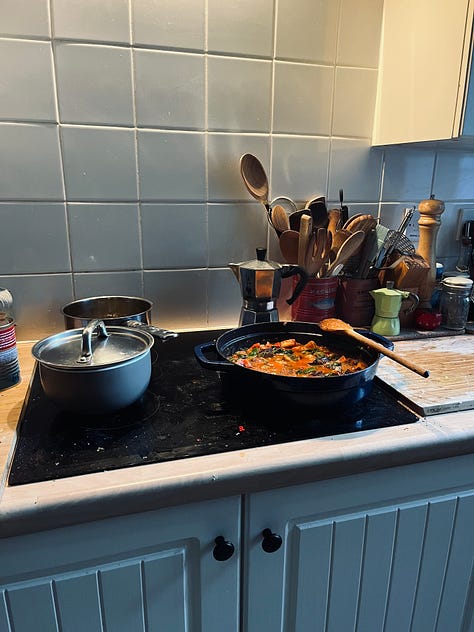
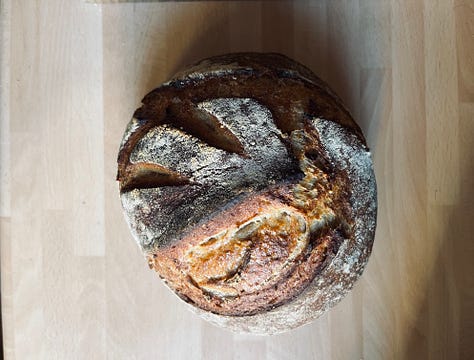
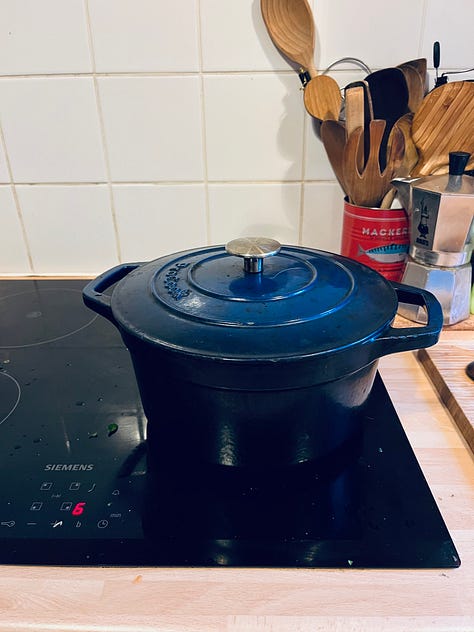
‘So long as you write what you wish to write, that is all that matters; and whether it matters for ages or only for hours, nobody can say.’ Virginia Woolf wrote in A Room of One’s Own. Move the quote inside the kitchen, and it becomes a mirror for our contemporary times: So long as you cook what you wish to eat, that is all that matters; and whether there are leftovers or it serves one meal, nobody can say. Who gets to eat as they wish? Who has the resources to cook? Should I, you eat as we please, or should you, I eat as the land influences us so the soil would have a chance to cope with our needs? Seasonally, if I dare say. How does one feed for one at a time of mass-consumption, when a single courgette costs more than each courgette inside a pack of three at the supermarket?
Financials aside, as the economics behind food systems require their own essay, I am interested in pleasure. Pleasure is syrupy and sour, sticky and fizzy; it is heat chased by an ice cube, and pleasure has become a complex argument in a society that has grown wary of self-pleasures. I am thinking about masturbation and how popular culture has demonised teenagers for the candied smell of its performance, as if long gone were hangover days spent with yourself and a bit of TV, and this and that under the duvet, as if pleasures needed to be eradicated for their unworthiness. And beyond, I am thinking about time spent enjoying the present moment and doing nothing else, other than the one thing, plays: walking without thinking; riding the bus without reading the news, but catching the sunrise, waking up early and staying in bed to hear the woodpecker outside of the window; sitting on the sofa with a friend, wordless, together; writing words never to share them, drawing something new, cooking to eat, eating to grab a taste of that, or this – pleasures for which we individuals have subjective agency.
Selfish, you may think. I thought about it too.
But then I write this newsletter in my kitchen, literally, where my desk is set-up. And there is nowhere like the kitchen to spend time alone because the kitchen refutes most clichés about loneliness. A kitchen will always be communal, under any forms of totalitarianism or democracy, while the season is blooming outside or storms are battering crops in the fields, there isn’t one dish a cook can serve without opening the door of its kitchen, yet the cook is empowered to be doing the lifting alone, for as long as they don’t only take but give back, too. A kitchen is a trading place.
Aloneness isn’t loneliness and, if loneliness is a crowded room, aloneness is a kitchen.
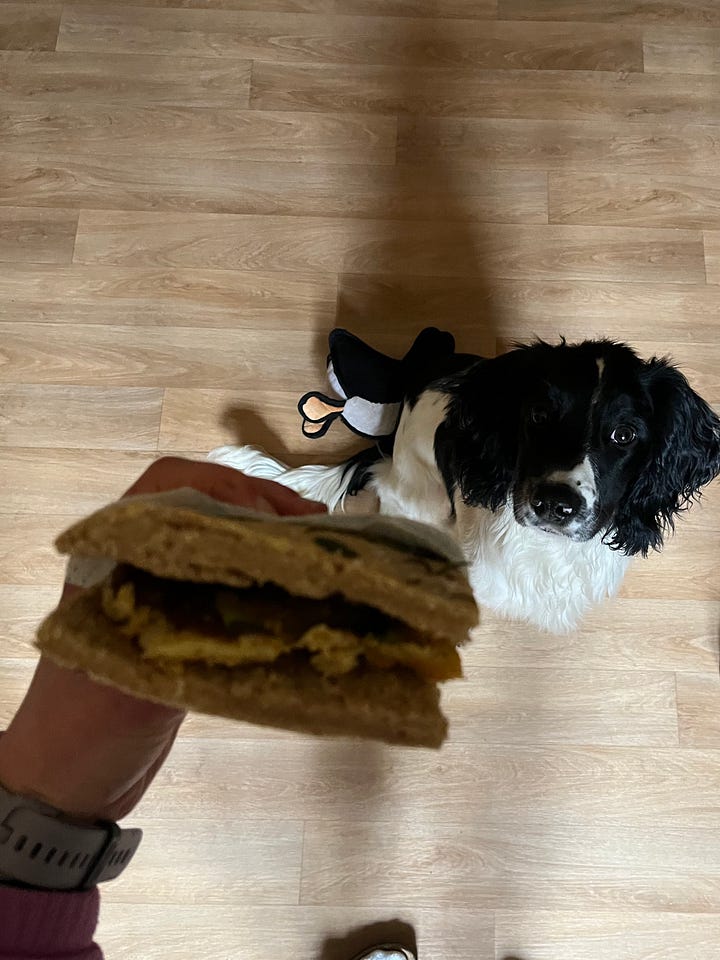
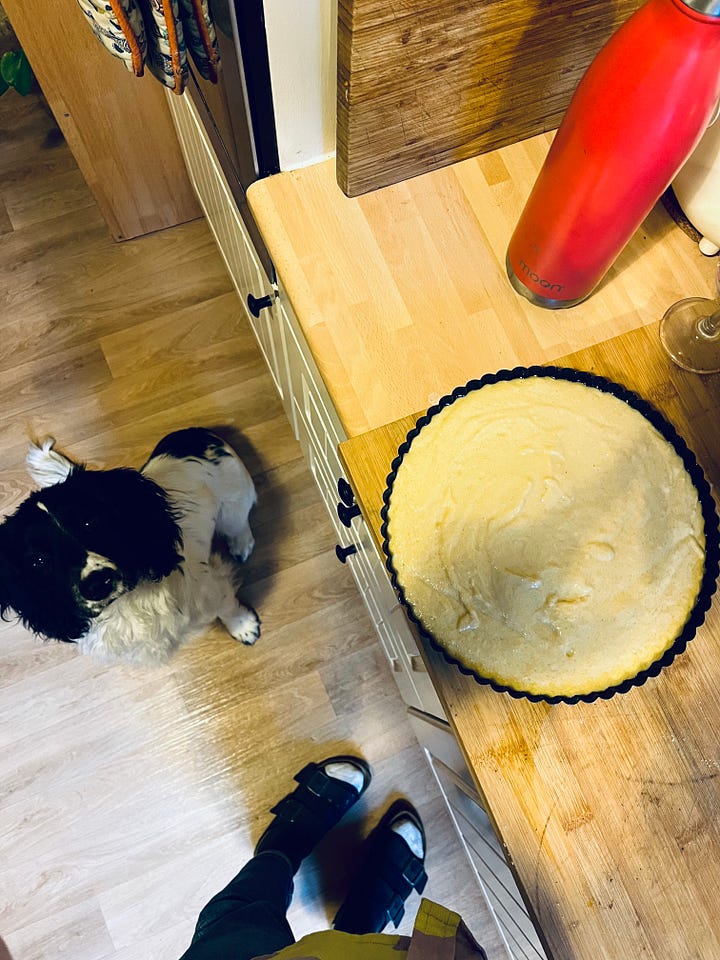
A kitchen has many rules, plenty are subjective like please let the butter be salted, others are driven by health and safety, as one should approach knives and gas carefully. Don’t forget to mention those allergies and other dietary requirements. Yet, cooking is freedom. A malnourished world is less inclusive, less diverse, less varied than a world where people have access to secure and affordable food systems. In the kitchen, everything and everyone is connected; one cupboard crosses borders and seasons; one meal opens new flavours, possibilities, thoughts. The kitchen is a treadmill, a journey that bounces back against four walls, somewhere safe to spend time alone, closing the door and setting rules of one’s own, and, still, the kitchen is a constant reminder that we have duties to each other. If we have been taught to feel shame about our loneliness, if loneliness has become passive and collective – connected, even, through a screen scroll – a feeling experienced en masse within an uber, individualistic society, aloneness is a choice at most, an active decision at the least. It can be both tender and political, so is the kitchen, regardless of how much you like to cook, nor do you need to be a cook to resent the kitchen for its tyrannies. For one, as much as I love my kitchen, I don’t always fancy cooking, I go as far as resenting the process at times, since feeding myself eats a larger share of my monthly budget than it ever did, pushing other dreams further away mentally, while keeping me going physically. The kitchen is a compound of circumstances, pleasures and obligations, and so is choosing to be alone in the 21st Century.
I am Virginia’s pup, thus a second quote:
‘For now she need not think of anybody. She could be herself, by herself. And that was what now she often felt the need of - to think; well not even to think. To be silent; to be alone. All the being and the doing, expansive, glittering, vocal, evaporated; and one shrunk, with a sense of solemnity, to being oneself, a wedge-shaped core of darkness, something invisible to others... and this self having shed its attachments was free for the strangest adventures.’
– To The Lighthouse by Virginia Woolf
It wasn’t the necessity for one’s own room that I questioned earlier but how we reframe the door that links the rooms of our own and the ones of their own, as well as all the rooms of our own. As a response to this, I am interested in how loneliness has been demeaned by our communities along history and across various movements, from politics to religion to mass media – the fear of both dining and dying alone, as if the two had the same and one cause in a misbehaving person. But aloneness isn’t loneliness and loneliness, I believe, is the consequence of a compromised aloneness. Once we break the ice of a standardised, western lifestyle – work out, work, play, sleep, repeat – aloneness ignite flickers of light between each monotonous shade of contemporary, urban living. The expressions of one’s principle(s), an affirmation of one’s right(s) to be as they do, please, wish, think.
I alone is my body before you, achy and pretty, my mind as it serves me and presents to you, with its traumas and ideas and biases embedded, and the empathy I indulge. It is myself as a fragment of a larger collage, an electron, therefore whole and sole as one but part of a larger body, an atom, or the so-called we as aloneness doesn’t come without responsibilities. To be alone doesn’t mean not looking after each other, not if the concept of loneliness widens enough, with confidence, into aloneness, so it can welcome multitudes without being shattered by loneliness.
Woolf’s strangest adventures, my cooking and writing alone in the kitchen, are two interconnected but personal ways to regain control in being an active member of a collective. Any organisation, whether it is a union, a community group or a sports association, thrives in its membership, drawing on each members’ skills and strengths, and how together they unite into something strong and forceful. George Orwell’s Animal Farm warned us, ‘all animals are equal, but some are more equals than others’, and I recognise that utopia has its own dangers, so do people, but also the most unexpected changes arise from unlikely people coming together, and unlikely people are encounters of a society in which people have experienced enough aloneness to get to know themselves and to thrive as independent, resourceful and creative beings.
‘For masterpieces are not single and solitary births; they are the outcome of many years of thinking in common, of thinking by the body of the people, so that the experience of the mass is behind the single voice.’
– A Room of One’s Own, Virginia Woolf
Consider the teaspoon of rose harissa in the zuppa di farro an aftertaste of my origins, the scoring lines on the loaf of bread I had baked a sign of my presence, clues from a time I had spent alone before writing to you. Aloneness roots deep inside me, an instinct about something not being fair, a gut feeling about a necessary change, the breezy feel of happiness, the wings of hope; aloneness embraces all the necessary inward expressions of the self that must find resonance outward, so we can be and be part of a community of care.
[recipe for a brothy minestrone below, or a generous soup that can host a solo feast as much as a party*]
margaux
*recipe for Monday’s minestrone:

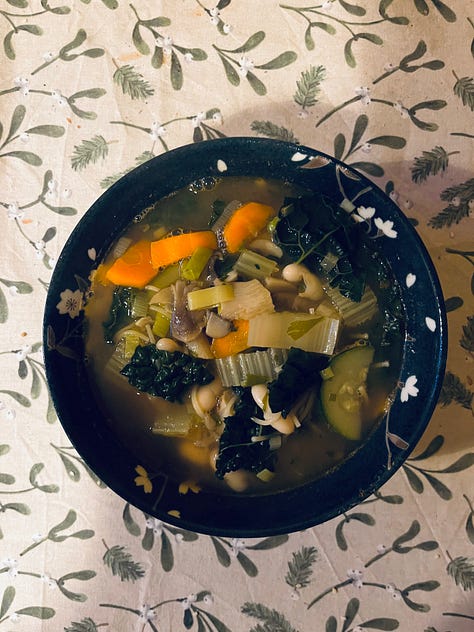

This soup preserves well in a casserole (lid on).
1 leek, sliced
1 handful of parsley, chopped
3 celery sticks, sliced
2 carrots, peeled and chopped
1 generous handful of cavolo nero, trimmed and chopped
1 courgette, cubed
1 handful of chestnut mushrooms, roughly chopped
1 handful of frozen broad beans
1 handful of frozen peas
1 can of cannellini beans (water preserved)
1 handful of filini pasta
1 tablespoon of tomato purée
veggie broth, potentially yours, or a stock cube
onion (store-bought) stock cube
Bring water to the boil and prepare the broth (i’m afraid one can’t measure broth, but i tend to fill three thirds of my kettle; you can always top it up with more boiled water later). Leave aside.
In a large heavy-duty casserole, fry up the leek and the parsley gently. Add the celery and keep braising the veggies over a low heat, so the vegetables don’t burn but become translucent. Add the cavolo nero, courgette and carrots, give it a good stir, and keep cooking the vegetables. Do follow your heart on this one, but I tend to let the veggies cook for 10 minutes, then I add the mushrooms and cook the potion for another 5ish minutes. Pour the broth, bring to the boil and, as soon as it bubbles, reduce the heat to a low simmer. Add the broad beans, peas, cannellini beans (including the water from the can) and the tomato purée. Cover with a lid; cook, maybe 5 minutes? Add the filini pasta, keeping the lid off, and cook for another 4 minutes or until the pasta is cooked. Serve, blow, eat.
thank you for reading The Onion Papers. i’m margaux, a writer and cook, and this is my hybrid newsletter. if you enjoy my work, remember to subscribe and/or invite friends to the party as you keep me going <3
Thursdays are for long reads and Mondays are for annotated (unmeasured) recipes (to paid subscribers), both come out every other weeks. Peels, a writer’s almanac, go to all subscribers on the first Monday of the month. O, I write novels too.
#32: Spring Equinox: seven recipes
Monday is grey and disappointing. The city poured so much energy into St Patrick’s Day at the weekend, it runs out of steam on the date, the green overcast by the colour of coal that wears down clouds in the sky, the main station busy with commuters, beanies on instead of party hats. Dinner mustn’t ask for more than one pot but be indecisive is fine: fr…






